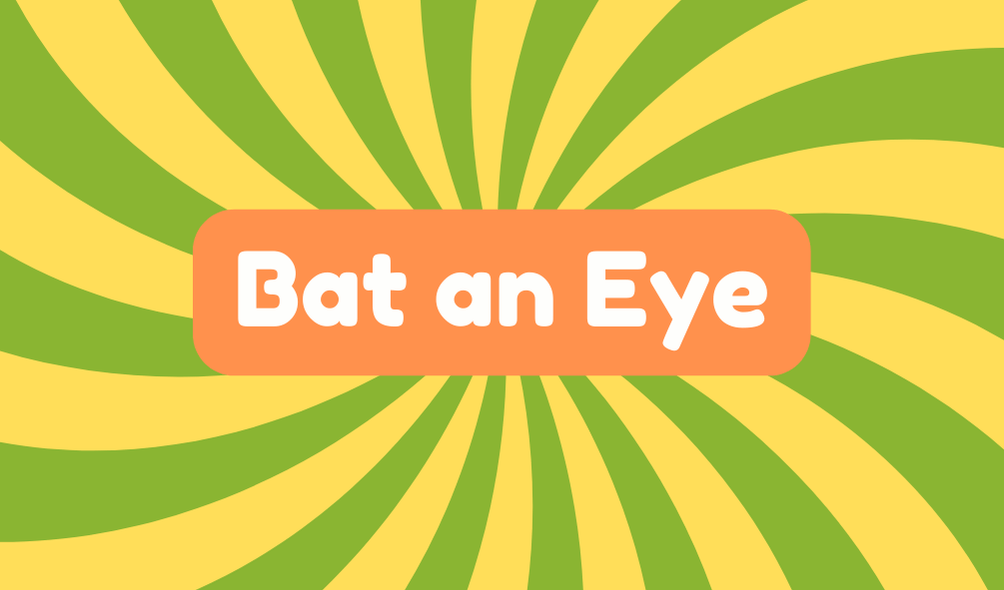"Bat an eye" means to show no surprise or concern in response to something significant. Its origin lies in 15th-century falconry, where "bat" referred to the fluttering of a falcon's wings, implying a lack of response. Over time, this idiom evolved to reflect emotional indifference, especially in today's world, where harsh realities often elicit no strong reactions. For example, someone glued to a book might not bat an eye at a loud crash. This phrase sheds light on our troubling acceptance of emotional detachment in modern society, making it a relevant term that worth exploring further.
Synonyms
When someone says they didn't bat an eye, they're often expressing a kind of emotional detachment or indifference. You might hear these synonyms, reflecting how society is normalizing emotional responses—or rather, a lack of them:
- Not blink an eye – Shows complete emotional disengagement.
- Keep a straight face – Suggests you're suppressing your true feelings.
- Shrug it off – Implies you're dismissing something significant.
- Take it in stride – Indicates a carefree acceptance of surprising situations.
These expressions illustrate how we're becoming more emotionally detached in an ever-changing world. Our cultural normalization of such reactions raises questions about our awareness of distressing events. By understanding these synonyms, you can better grasp how society influences your emotional responses.
Example of Sentences
Emotional detachment often surfaces in everyday situations, showcasing how people can remain unphased by shocking events. Here are a few examples that illustrate this phenomenon, especially in the lens of cultural normalization:
- The man didn't bat an eye at the loud crash, absorbed in his book.
- The crowd silently passed by, ignoring the homeless man pleading for help.
- A student received harsh criticism yet showed no sign of distress or worry.
- Strikes and protests often draw passive spectators who just carry on without a second thought.
These moments reflect a troubling acceptance of indifference, where emotional detachment becomes a norm. You might see it in how society handles distressing situations, desensitizing individuals to critical issues around them.
Origin
The phrase "bat an eye" has its roots in falconry practices from 15th century Europe, where the term "bat" referred to the fluttering of a falcon's wings. This historical significance ties back to how hunters relied on birds of prey for capture during war and hunting expeditions. By the 18th century, the idiom evolved to denote a lack of response, indicating indifference towards surprising or shocking events. It's fascinating how language transforms, yet remains rooted in specific activities and cultures. This phrase now reflects a societal tendency to normalize alarming behaviors, raising questions about our emotional detachment. As you endeavor for innovation in your understanding, consider how language influences our reactions and attitudes towards the world around us.
Collocations
Understanding the phrase "bat an eye" brings us to explore its collocations—words and phrases that commonly appear alongside it. These collocations help illustrate the emotional detachment and indifferent reactions often associated with this idiom. Here are a few examples:
- Show no concern – Highlighting a lack of worry.
- Remain unfazed – Indicating resilience to shocking events.
- Express disinterest – Reflecting emotional detachment from situations.
- Exhibit coldness – Demonstrating an indifferent reaction to stimuli.
How to Use in Everyday Language
In everyday conversation, you can easily incorporate the phrase "bat an eye" to convey indifference or lack of reaction to surprising events. For instance, you might say, "He didn't bat an eye when the news hit." This expression is perfect for highlighting emotional detachment in situations where one might expect a stronger response. Use it in casual chats about friends who shrug off drama or in discussions about bizarre news cycles that barely faze you. By integrating this phrase into your everyday applications, you not only express a critical view of societal numbness but also challenge the normalization of disturbing behaviors. So next time you witness something shocking, remember to reflect on the emotional detachment it represents—maybe even don't bat an eye.
Why Is It Still Relevant Today?
Reflecting modern societal norms, the expression "bat an eye" remains relevant today as it captures our widespread desensitization to disturbing events. In a world bombarded with alarming news, you might notice that emotional detachment has become a common response. Imagine scrolling through headlines of violence or tragedy; often, you don't flinch. This cultural desensitization skews our emotional reactions, making societal indifference seem normal. Situations that should provoke concern barely register, and this raises questions. Why don't we react more strongly? As you navigate these realities, you'll see how this phrase underscores a troubling shift in our collective conscience. Understanding its significance is essential as we confront the implications of ignoring the distressing moments that define our times.







